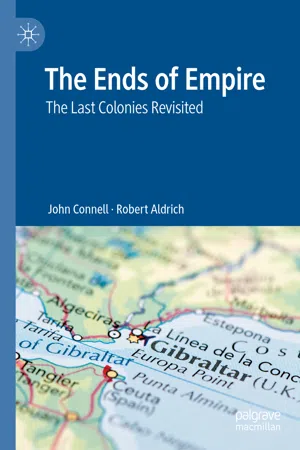The empires conquered by European powers, and by expansionist countries outside Europe, once covered much of the world. However, what colonial conquerors did, nationalists largely undid. Spain, Portugal, Britain and France took over much of the New World in the 1500s and 1600s, but by the early 1800s, most of their colonies in the Americas, if not in the Caribbean, had gained independence. In the early modern age, Europeans, voyaging southwards and eastwards, at the same time as the conquistadores sailed westwards, established toeholds on the African coast, in the Indian Ocean and the South China Sea, which served as beachheads for the ‘scramble’ for the interior of Asia and Africa. By the beginning of the twentieth century, almost all of Africa had come under European rule, as had much of Asia and Oceania. New powers—Germany, Italy, Belgium, Japan and the United States—had joined old ones in carving up the world. Yet those new empires, in the long run of history, did not endure. A wave of decolonisation swept Asia in the 1940s and 1950s, spread to Africa in the 1960s, and then to the Caribbean, Indian Ocean and Pacific islands. By the late 1900s, decolonisation seemed complete, the lowering of the British flag in Hong Kong in 1997 and the Portuguese flag in Macau in 1999 mere codas to the ending of empire.
To many, the ‘loss’ of Hong Kong seemed to show that the sun had finally set on the once mighty British empire, with the return of Macau a Portuguese footnote. No surviving ‘colonies’ had populations close to that of Hong Kong (6.5 million in 1997); Puerto Rico, then with 3.5 million, was the only one exceeding 1 million. That the retrocession of Hong Kong marked the end of a colonial era was a view generally shared. The historian, Piers Brendon, declared that, after Hong Kong, ‘the British system was defunct’ but added that ‘the spirit of imperialism is not dead’ (1997: 655, 656). He was scarcely thinking about remaining British outposts such as the Cayman Islands or St Helena. Yet, quite obviously, though many remaining overseas territories were small and seemingly irrelevant to world affairs—or even to their metropolitan overlords—they remained a global phenomenon.
These ‘confetti of empire’ as one French journalist famously labelled the French territories (Guillebaud 1976) or, equally pejoratively, the ‘last pink bits’ to a British journalist (Ritchie 1976), were considered too small, remote and resource poor to sustain independence. Indeed Ronen Palan (2015: 41) reflected, equally disparagingly, on the remaining British colonies that ‘By the 1980s, the largest empire the world has ever seen shrank down to contain just remnants and debris’. Their populations rarely demanded independence from ‘mother countries’, and some resolutely opposed it, while metropolitan authorities sometimes wished to hold on to certain territories for real or potential commercial or strategic advantage or as proof of enduring grandeur. France and the United Kingdom thus retain territories in every ocean, and the United States has military bases scattered around the world in its own territories and in independent countries.
None of the territories that were the subject of our 1998 book, The Last Colonies, have since gained independence, bearing out our cautious prediction that this would be the case. Nor are any likely to become independent in the near future. However, somewhat surprisingly, since we first wrote, South Sudan and Timor-Leste (East Timor) have become independent states, wresting their independence not from old colonial powers but from Sudan and Indonesia, successor states to abolished colonial empires. We chose not to dwell on the ‘colonies’ of independent ‘Third World’ states, that might have included Western Sahara, Rapa Nui (Easter Island), Bougainville and West Papua, places where nationalist movements have been active. Instead we focused on the territories of former colonial powers of Europe, and the United States, Australia and New Zealand. Meanwhile groups within independent continental states, from Tibet to Scotland, have also sought emancipation from ‘colonial’ domination. What ‘decolonisation’ means, and when, where and if it will ever end, are challenging questions.
The terminology of ‘colonies’ retained some validity in the past century (when Britain formally used the phrase ‘crown colonies’ to refer to its overseas outposts, though France angrily denied that their ‘overseas departments and territories’ were ‘colonies’). The word ‘colonies’ was nevertheless suitable enough for our title, not least because of the presence of independence movements in several of them. At the end of the second decade of the twenty-first century it is questionable whether ‘colonial’ is an apt adjective for territories where constitutional arrangements have been renegotiated and much administration devolved, international economic and geopolitical conditions have substantially altered, and independence dreams have dwindled. Here, we prefer the phrase ‘overseas territories’ (OTs), adopting and generalising the official United Kingdom usage. The residents of the contemporary OTs (other than migrants who have not been naturalised) are usually fully-fledged citizens of the metropolitan states of which they are a part. They have rights of abode in the metropole, and access to social welfare and other benefits, if not necessarily at metropolitan levels. In Spanish, Danish, French and American OTs, they vote for representatives in national assemblies (although, in the US case, their delegates have restricted rights). Voters in French, Spanish and three of the Dutch OTs also cast ballots in European parliamentary elections (Sutton 2012). Democratic processes exist in all OTs, alongside the rule of law, while generally there is a free press, freedom of assembly and similar human rights. Standards of living throughout the OTs are often the envy of residents or citizens of neighbouring independent states—and, indeed, per capita incomes in Bermuda and the Cayman Islands are higher than in Britain itself. Local cultures—languages, festivals, traditions—have gained greater recognition. Flags, anthems, banknotes and ‘national’ days provide symbols of belonging to a particular territory as well as to a larger nation-state. Residents draw on different sources of personal and collective identity, and an increasing number travel regularly between territory an...
